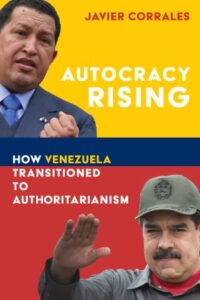In spite of sanctions, international isolation and protests, Nicolás Maduro’s authoritarian regime in Venezuela has managed to stay in power and make diplomatic gains, notes analyst Will Freeman.
Maduro has gained a reputation as a wily, adaptive autocrat. Ironically, it might have been easier to lord over an isolated enclave than to deal with the complex new realities of an internationally connected Venezuela, he writes in the Journal of Democracy:
It was one thing for Maduro to control a nearly uniformly impoverished population amid a cratered economy. But new revenue streams and diplomatic channels connecting Venezuela to the world are producing a new, messier reality that will require Maduro to recalibrate his balancing act. By the same token, however, the opposition may discover new fault lines in the regime coalition ripe for exploitation.
 A critical factor in the upcoming election cycle is voter participation, given that an increasing number of Venezuelans who are unregistered voters and moving to urban areas or leaving the country, said Miriam Kornblith (above), a former vice president of the Venezuelan National Electoral Council, which profoundly impacts voter registration as it guarantees the transparency of all elections and referendums.
A critical factor in the upcoming election cycle is voter participation, given that an increasing number of Venezuelans who are unregistered voters and moving to urban areas or leaving the country, said Miriam Kornblith (above), a former vice president of the Venezuelan National Electoral Council, which profoundly impacts voter registration as it guarantees the transparency of all elections and referendums.
“There are a number of other aspects which are directly related to the neutrality of the Electoral Council, and that, unfortunately, has been totally distorted in Venezuela,” she told Eric Farnsworth, vice president of the Americas Society/Council of the Americas, who cited state-sponsored press as an instance of social media undermining democracy.
“Nondemocratic forces have taken the lead on social media to control populations, instill falsehood, to distort reality, to steer polarization, and that has had a very significant impact,” agreed Kornblith, Senior Director for Latin America and the Caribbean at the National Endowment for Democracy (NED).
 In his new book, Autocracy Rising, Javier Corrales focuses on two themes – party systems and institutional capacity: Venezuela’s democratic backsliding advanced when the ruling party obtained far too much electoral clout while the opposition fragmented. The state then took control of formerly independent agencies of the state. This allowed the ruling party to use and abuse of the law to favor the president—which in turn generated a permanent economic crisis.
In his new book, Autocracy Rising, Javier Corrales focuses on two themes – party systems and institutional capacity: Venezuela’s democratic backsliding advanced when the ruling party obtained far too much electoral clout while the opposition fragmented. The state then took control of formerly independent agencies of the state. This allowed the ruling party to use and abuse of the law to favor the president—which in turn generated a permanent economic crisis.
Any democratic transition in Venezuela must be home-grown and driven by local actors, says a leading analyst.
Only the country’s own protagonists will ultimately determine if and when Venezuela restores democratic rule; only a well-organized opposition rooted in Venezuela can effectively take on Nicolás Maduro, who has proved to be a canny operator, Georgetown University’s Michael Shifter writes for Foreign Affairs.







